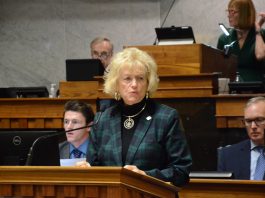Marilyn Odendahl for www.theindianalawyer.com
With petitions still pending at the U.S. Supreme Court over Indiana’s 2016 abortion law, two new anti-abortion bills are moving through the Statehouse and at least one, if it becomes law, could drag the state back into court for a new battle.
House Bill 1211, authored by Rep. Peggy Mayfield, R-Martinsville, places more restrictions on second-trimester abortion or what the bill refers to as “dismemberment abortions.†The measure passed through the lower chamber on a 71-to-25 vote with three Democrats not voting and one Democrat excused. Four Democrats voted in favor of the bill.
Senate Bill 201, authored by Republican Sens. Liz Brown of Fort Wayne, Linda Rogers of Granger and Travis Holdman of Markle exempts nurses, physician assistants and pharmacists from being required to perform an abortion or assist in such a procedure. The legislation was approved by the upper chamber on a 39-to-1 vote and is moving to the House floor after being approved by the House Committee on Public Health along a party-line 9-to-4 vote.
Opponents of this bill are concerned it could deny women access to treatments for non-abortion medical issues on the basis that a pharmacist suspects the drugs will be used to terminate a pregnancy. Also, some see the possibility the bill could be laying the groundwork for a broader attack, in the future, on access to birth control.
Brown maintained the measure was just expanding existing law that exempts physicians from participating in abortion procedures on religious, moral and ethical grounds. However, Rep. Robin Shackleford, D-Indianapolis, pointed to language in the current draft of the bill that could be construed to limit the ability to obtain contraceptives.
Although the committee voted on SB 201, the bill’s sponsor, Ron Bacon, R-Evansville, agreed to work on an amendment clarifying the language. That amendment would be offered during the second reading of the bill.
Mayfield’s HB 1211 has not been assigned to a Senate committee but Brown and Sen. Mark Messmer, R-Jasper, have signed on as sponsors. The measure prohibits dilation and evacuation abortions unless the mother’s health or life is at risk and imposes a criminal penalty of a Level 5 felony on doctors who knowingly and intentionally violate the prohibition.
HB 1211 ignited a lengthy and tense hearing at the House Public Health Committee in February. Several supporters and opponents of the bill testified while legislators pressed some individuals on their qualifications and the substance of their testimony.
After the bill’s passage in the House, Planned Parenthood of Indiana and Kentucky maintained its opposition to HB 1211.
“We are disappointed that yet again our state Legislature chose to continue to put politics above the health care of Hoosiers,†said Wanda Savala, public affairs director for PPINK. “At the end of the day, this is about health care.â€
Indiana Right to Life, which was among the organizations supporting HB 1211, did not respond to a call and email requesting comment. However on the organization’s website, IRL president and CEO Mike Fichter issued the following statement, “Today’s historic vote brings us one step closer to ending barbaric dismemberment abortions in Indiana. We look forward to the Senate taking equally decisive action in the weeks ahead.â€
Other states have passed legislation similar to HB 1211 and most have been struck down by state and federal courts. The first such bill was passed in Kansas in 2015 and since then, Oklahoma, Alabama, Louisiana, Texas, Mississippi, West Virginia, Kentucky and Arkansas have followed.
In August 2018, the 11th Circuit Court of Appeals affirmed Alabama’s law banning the D&E procedure was unconstitutional. A split panel upheld the ruling of the U.S. District Court for the Middle District of Alabama that the law constituted an “undue burden on abortion access.â€
Alabama has petitioned the U.S. Supreme Court to review what is now Scott Harris et al. v. West Alabama Women’s Center at al., 18-837. A coalition of 21 states, including Indiana, has filed an amicus curiae brief in support of Alabama’s law.
Rep. Sean Eberhart, R-Shelbyville, highlighted the possibility of legal action during the House committee hearing on HB 1211. He noted Indiana has already spent millions of dollars defending other abortion laws that have been blocked by the courts.
In particular, key provisions in House Enrolled Act 1337 have been struck down by the federal courts. Indiana has filed a petition for writ of certiorari with the U.S. Supreme Court for a review of the provisions banning abortions because of the race, sex or genetic anomaly of the fetus and requiring fetal remains either be buried or cremated.
The petition in Kristina Box, Commissioner, Indiana Department of Health et al. v. Planned Parenthood of Indiana and Kentucky, Inc., et al., 18-483, has been distributed for conference among the justice of the U.S. Supreme Court six times. The most recent was March 1, 2019.
Indiana’s second petition before the U.S. Supreme Court seeks to uphold the ultrasound provision in HEA 1337. The law requires women to get an ultrasound 18 hours before an abortion, but it was struck down because if placed an undue burden on women.
The case is Kristina Box, Commissioner, Indiana Department of Health et al. v. Planned Parenthood of Indiana and Kentucky, Inc., et al., 18-1019.



